Having used KeySearch for several months, I’ve put the tool through its paces to see if it really lives up to its promise.
In this KeySearch review, I’ll break down every key feature – from its keyword research capabilities to competitor analysis, backlink tracking, rank tracking, and more.
I’ll also weigh its price and value for money, giving you a clear picture of if it’s the right SEO tool for you.
Let’s get started.
Here’s My KeySearch Review After Using it for 14 Months
KeySearch Makes Keyword Research Easy
↳ First off, it is very easy to use.
The interface is so clean and everything is right there. Even if you’re using it for the first time, you won’t really have any difficulty navigating through it.
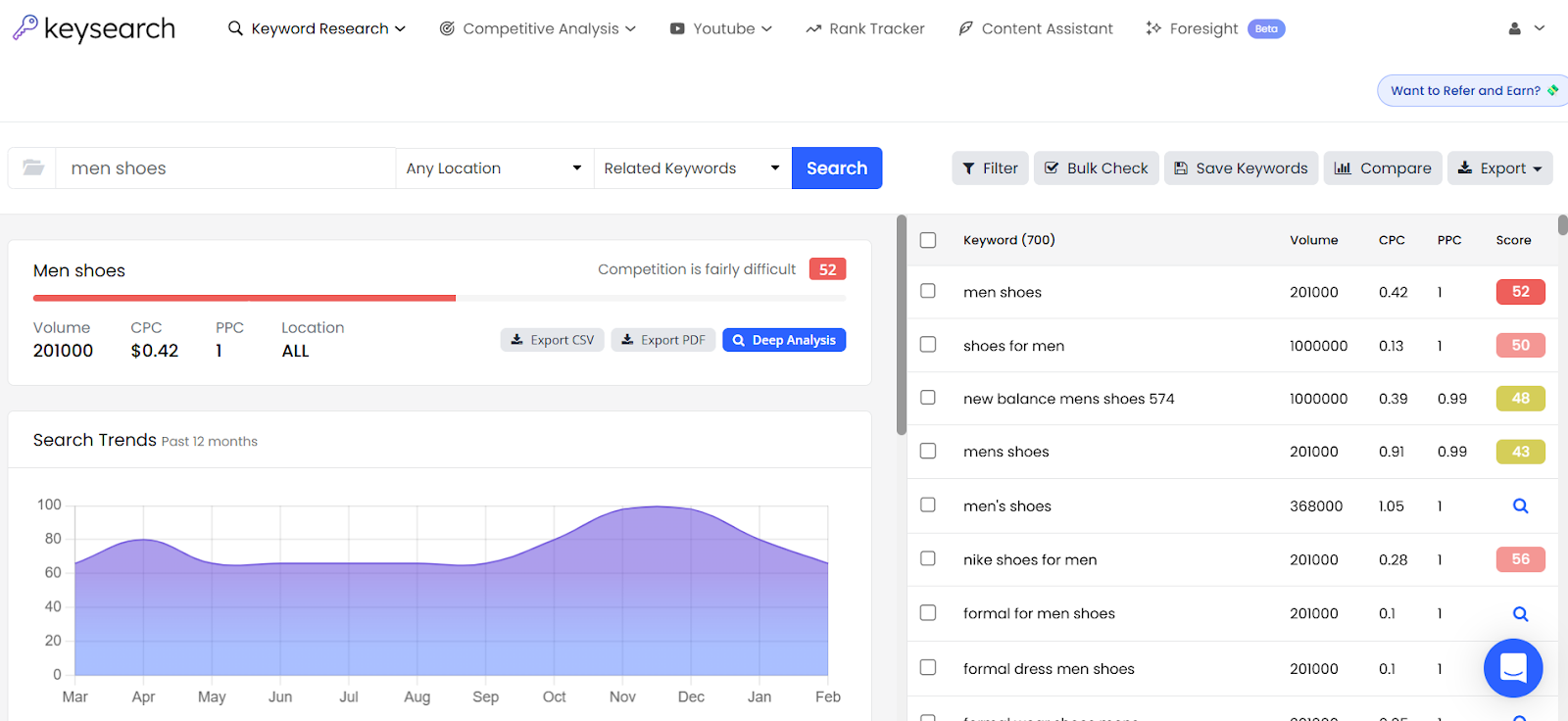
The keyword lists come with all the essential metrics like search volume, CPC, PPC, and a color-coded difficulty score.
Then, there are filters to help you narrow down the list to the most relevant keywords. This makes it really quick to identify low-competition keywords that are ideal for your content.
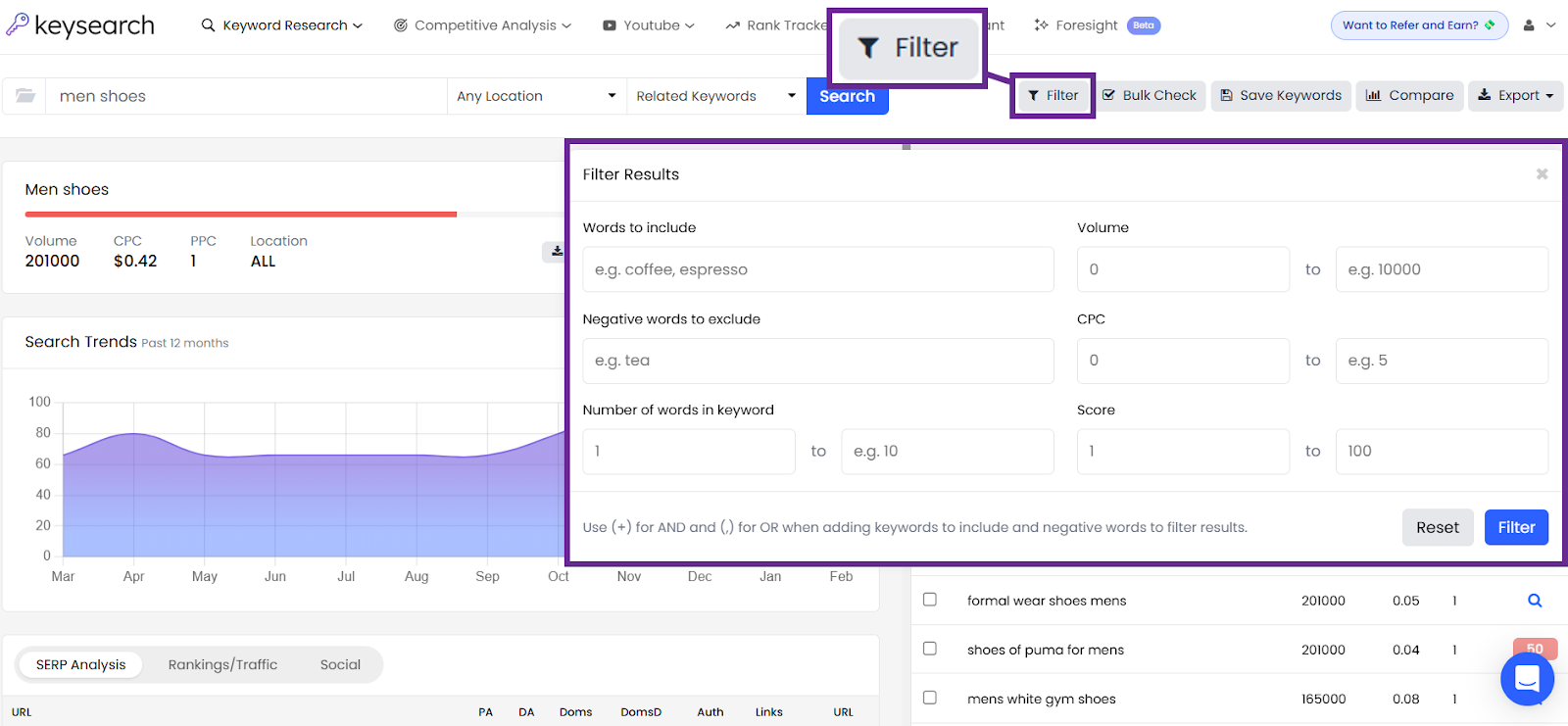
↳ You can also gauge the potential of a keyword and related keywords with Deep Dive.
Other than the basic stuff, I like the extra metrics like the Trend, Est. Links, DA and Ranking Pages. This gives you a better idea of a keyword’s performance and potential– along with other related keywords.
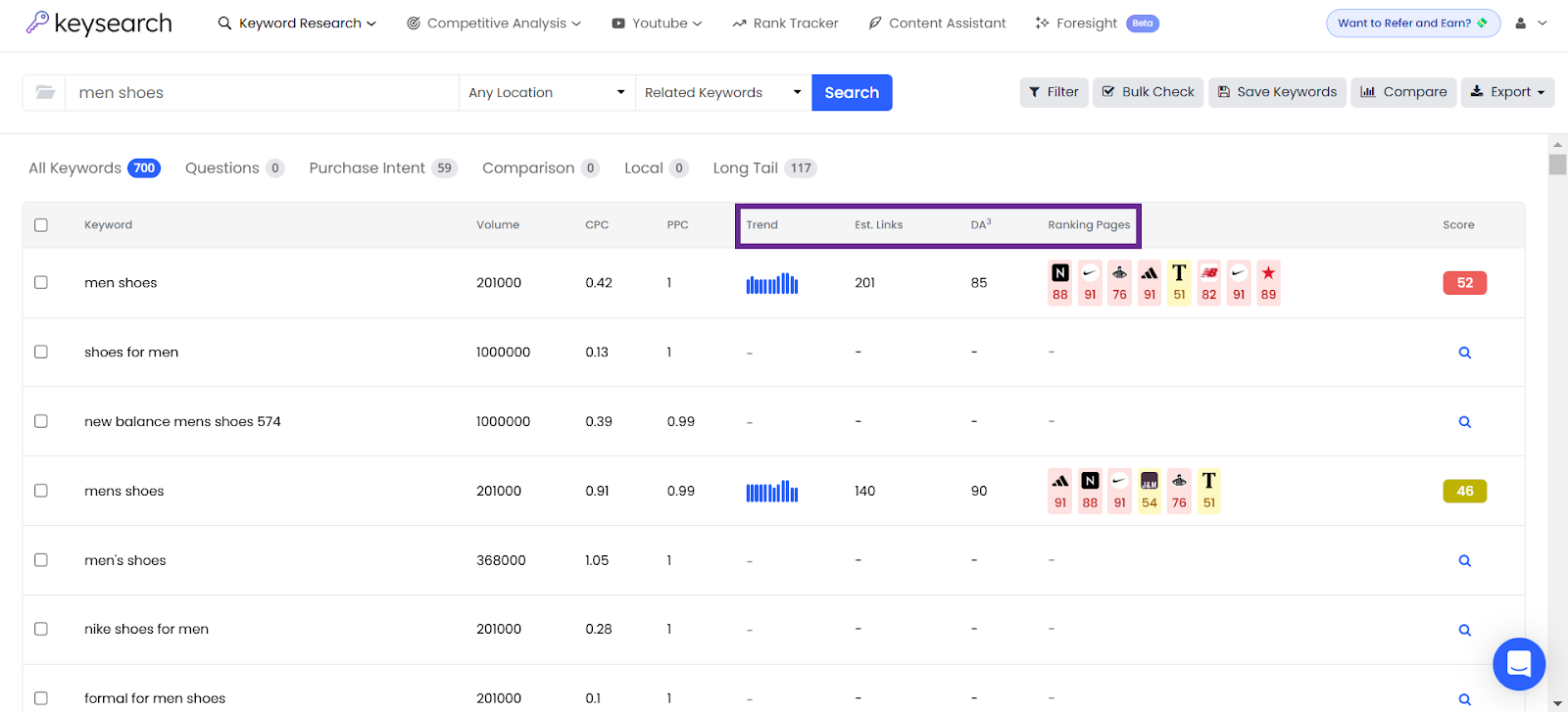
↳ It also lets you analyze your keywords in bulk.
You can enter up to 50 keywords at once into the Quick Difficulty tool, and it will give you their volume, CPC, PPC, and KD score– so you can drop low-potential keywords and focus on the best ones.
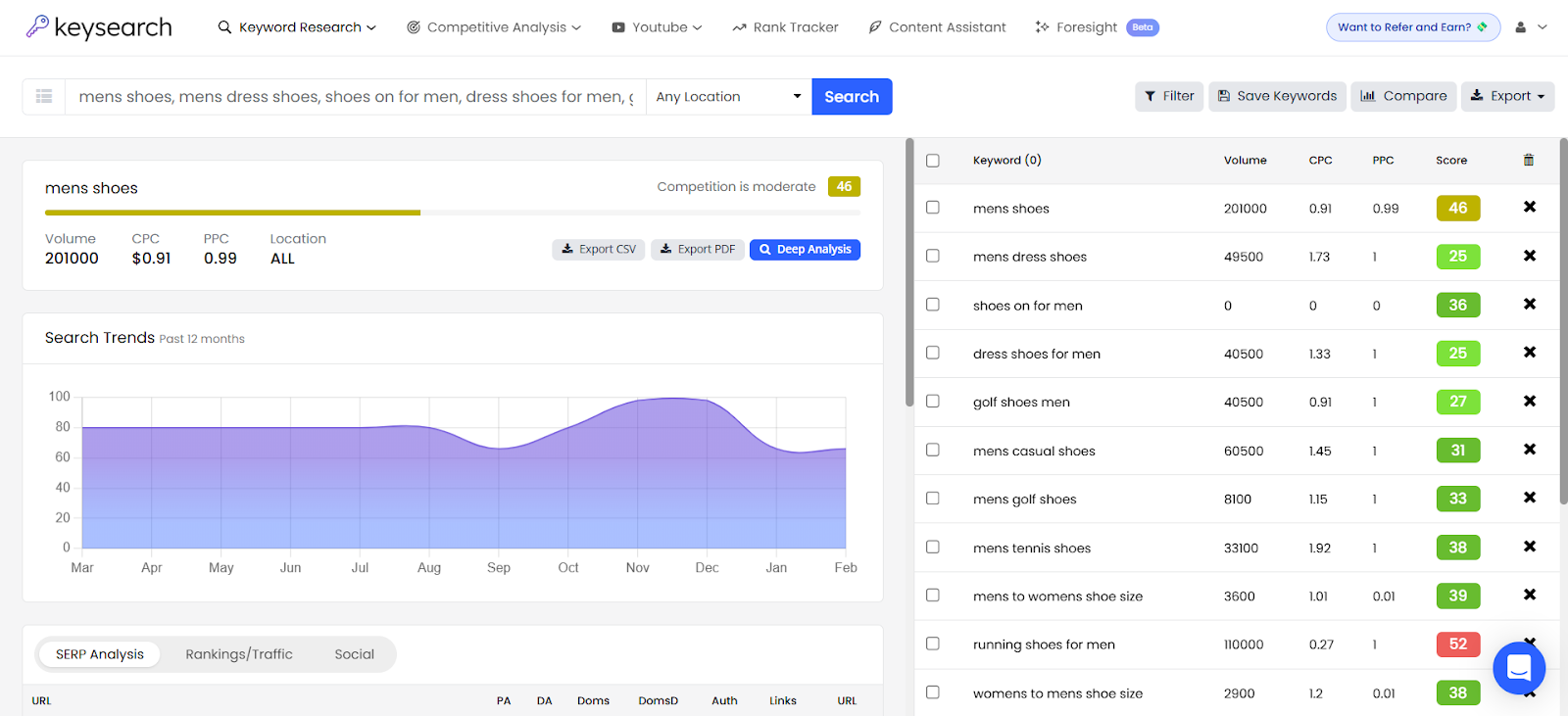
↳ However, I wish I could just copy-paste my keywords onto it.
Unlike many SEO tools, KeySearch doesn’t provide the option to upload keywords or paste them onto it. You have to enter each keyword manually– separated by commas. I wish they would do something about it.
↳ But I love the Deep Analysis feature.
As the name suggests, it gives you a very deep and detailed report of a keyword’s performance on the SERP. It shows you how a certain keyword has trended over time, how strong the pages ranking for it are, and a list of LSI keywords.
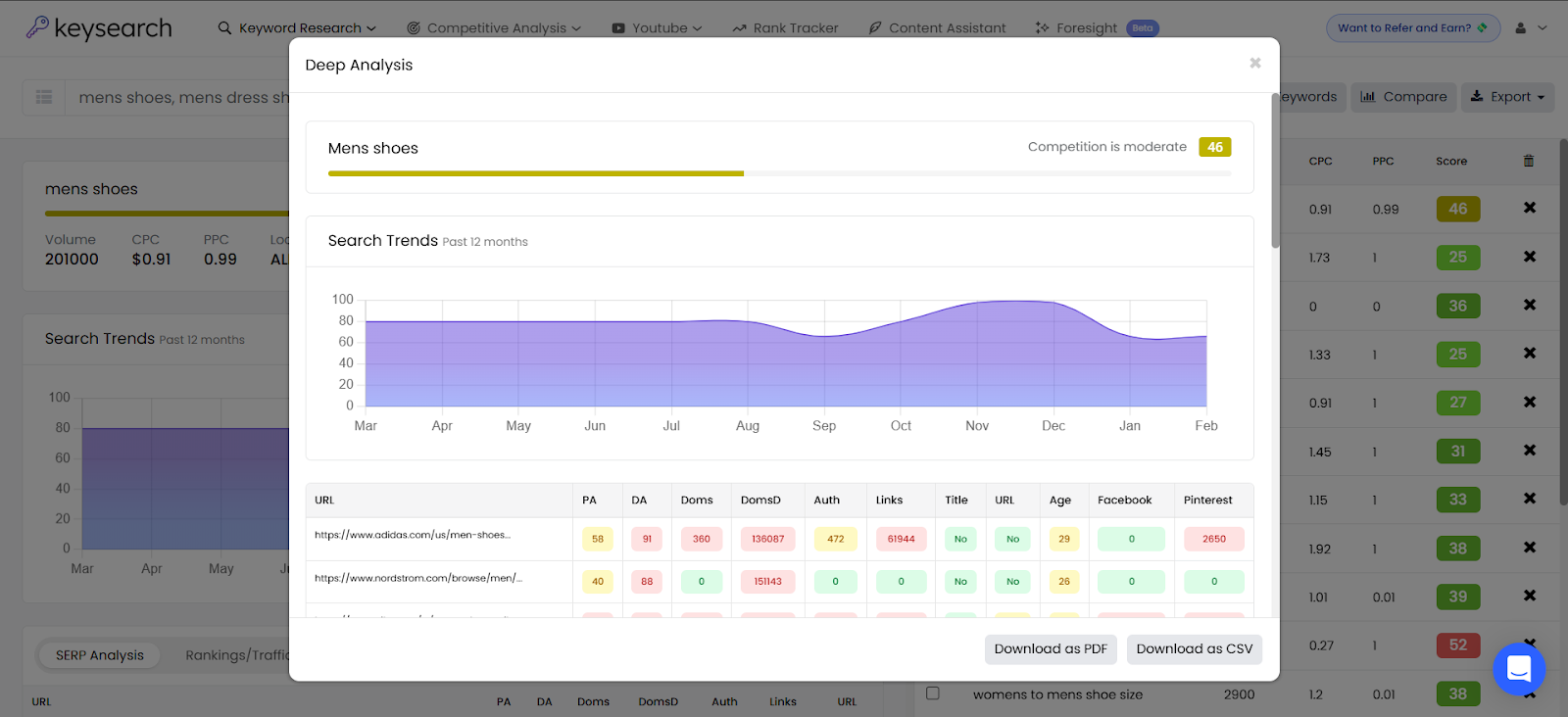
This really helps get a visual picture of a SERP’s competitiveness.
↳ And it helps you brainstorm keyword ideas.
The Brainstorm tool gives you a ton of keyword ideas in a fraction of a second. I often use it to find long-tail keyword ideas.
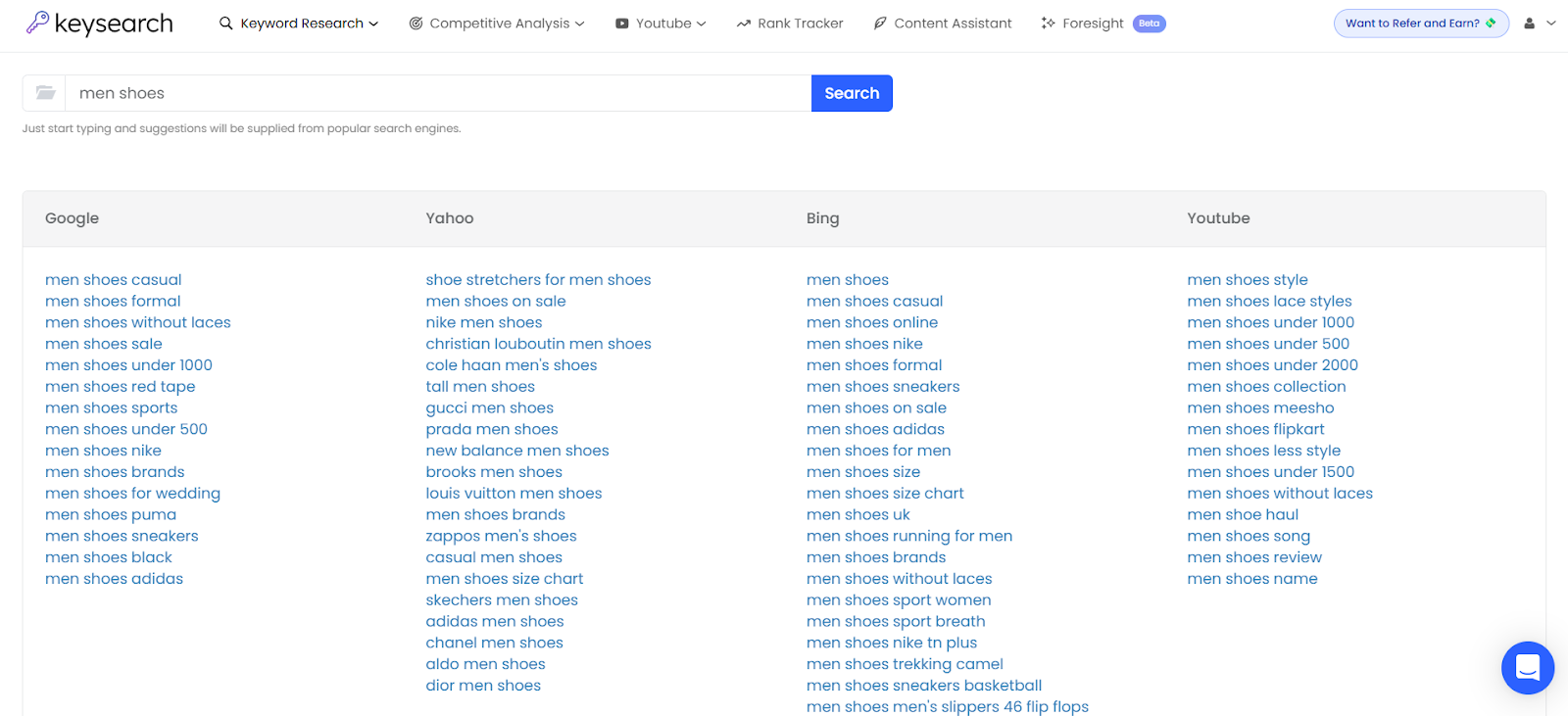
But I wish these suggestions also had metrics, so I knew right away which ones to pick or drop. Instead, I have to copy the ones I think make sense and run it through its Keyword Research tool.
It’s already such a hassle, and the fact that I can’t directly paste those keywords makes it even more frustrating. And if you select more than 50 keywords, that’s another round of this frustrating routine.
Competitor Tools Show What You’re Missing
The Competitor Gap Analysis is a handy feature if you want to see where your rivals are gaining ground. It offers a bunch of features that help you analyze your competitors from different angles.
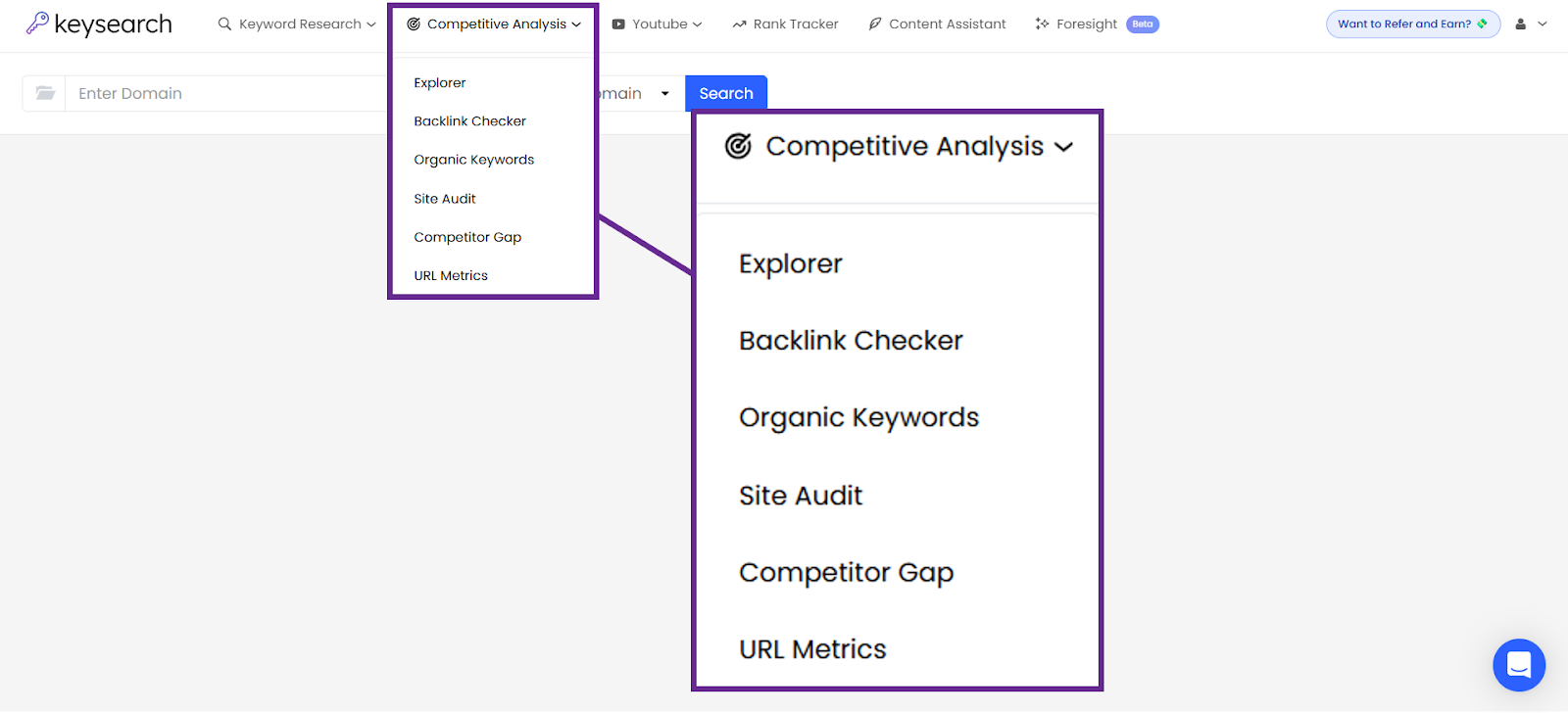
↳ For starters, Explorer lets you give an overview of your competitor’s domain.
The detailed report along with helpful visualizations and graphs gives a quick yet detailed look into your competitor’s domain. From Domain strength to their Organic Keywords, Backlink, Referring Domains, and more– the report covers all the essential aspects of your competitor’s domain.
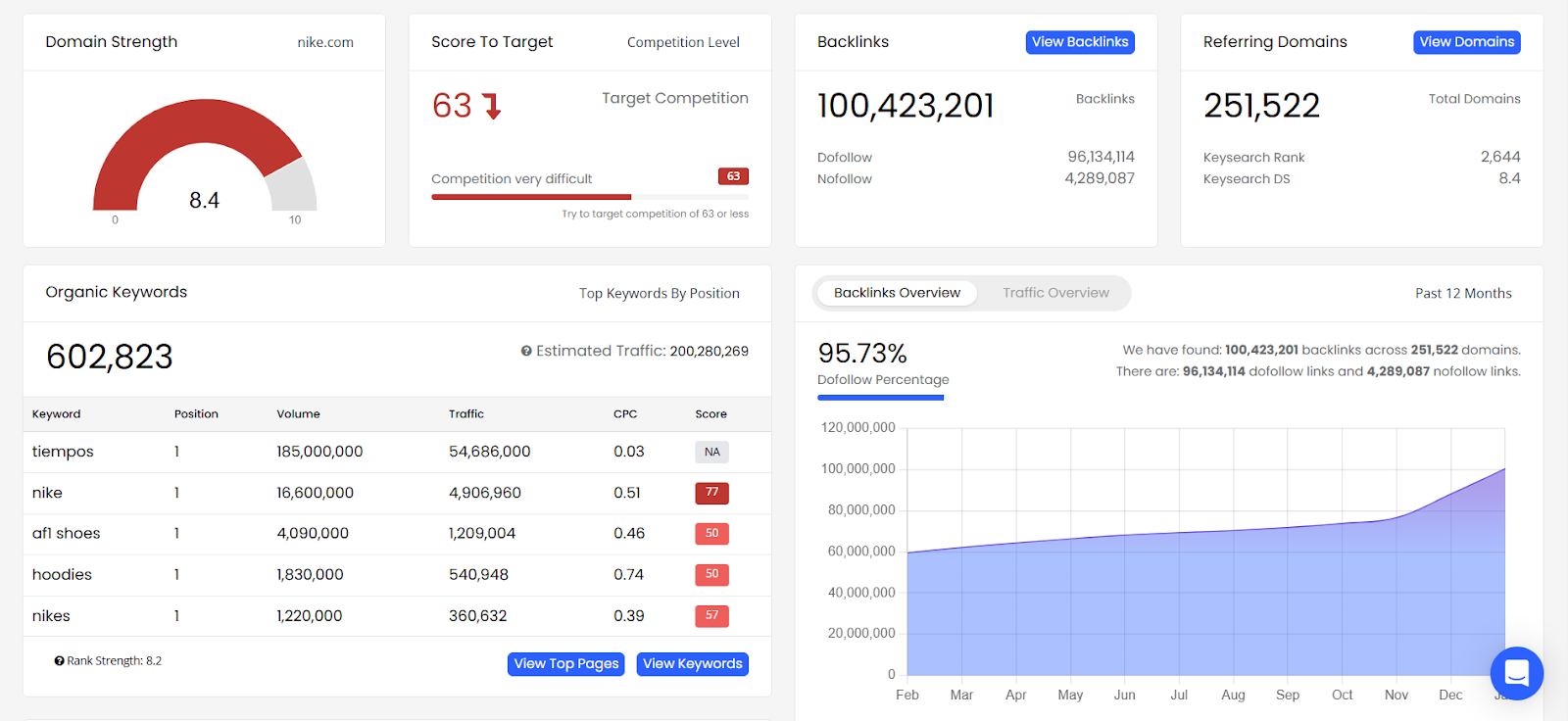
But I wish there was an option to add more than one domain and do a side-by-side comparative domain analysis– like you can in tools like Semrush. In KeySearch, you have to do comparative domain analysis manually.
Still, for the price you pay and other benefits, it’s not a complete deal breaker.
↳ You can also do keyword gap analysis with KeySearch’s Competitor Gap tool.
It lets you compare your domain with up to 3 competitor domains to find keywords that your competitors are ranking for and you don’t.
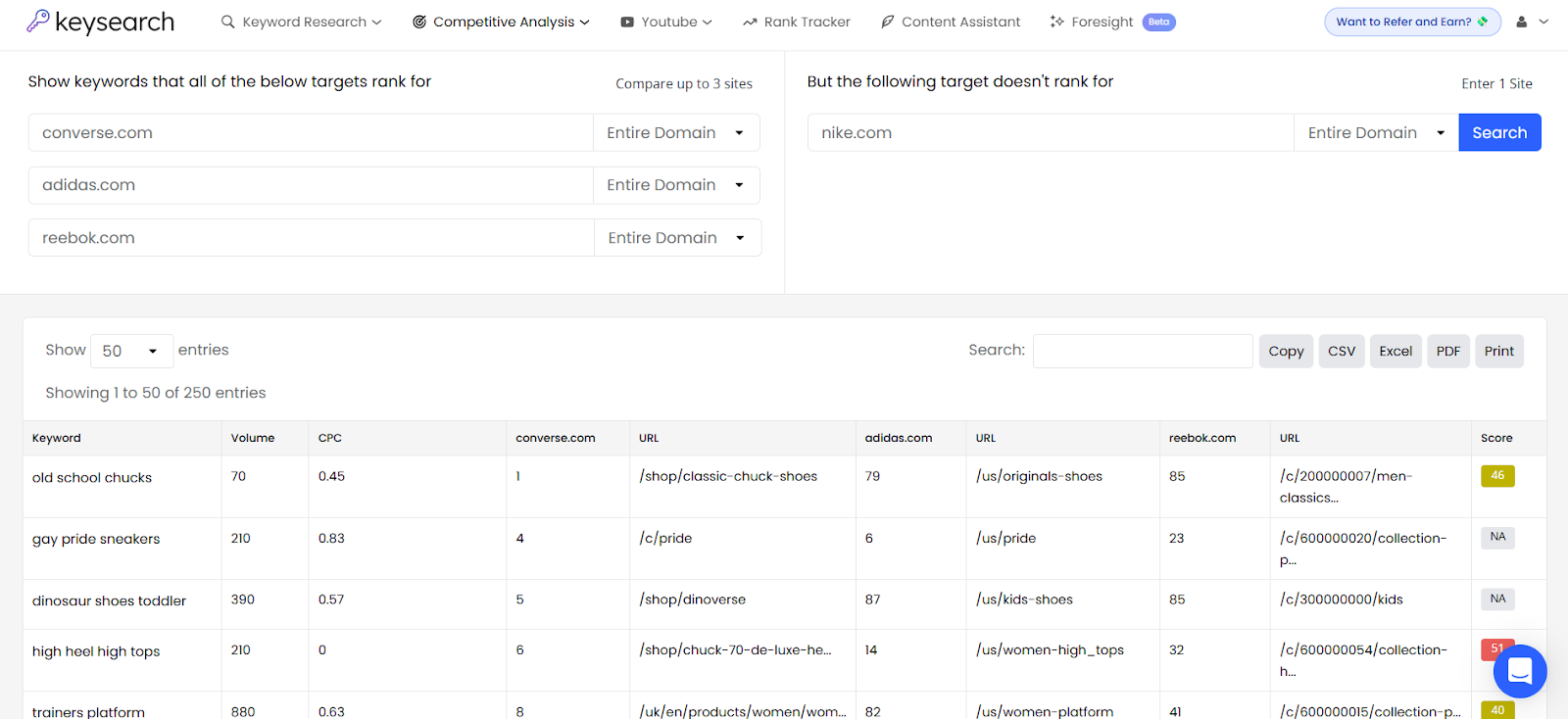
In fact, it even shows the exact URLs where your competitors are using the keyword. So, you not only find missed keywords but also get ideas and inspiration on how you can use them to stay competitive.
↳ And the URL Metrics feature lets you compare up to 200 URLs at once!
Within seconds, it shows a comparative table of the URLs you entered along with important metrics like PA, DA, DS, Links, Authority, and so on. This gives you an overall idea of your competitors’ URLs in comparison to yours. I use it to understand the pattern like average links, traffic, etc. of competitors in a certain industry.
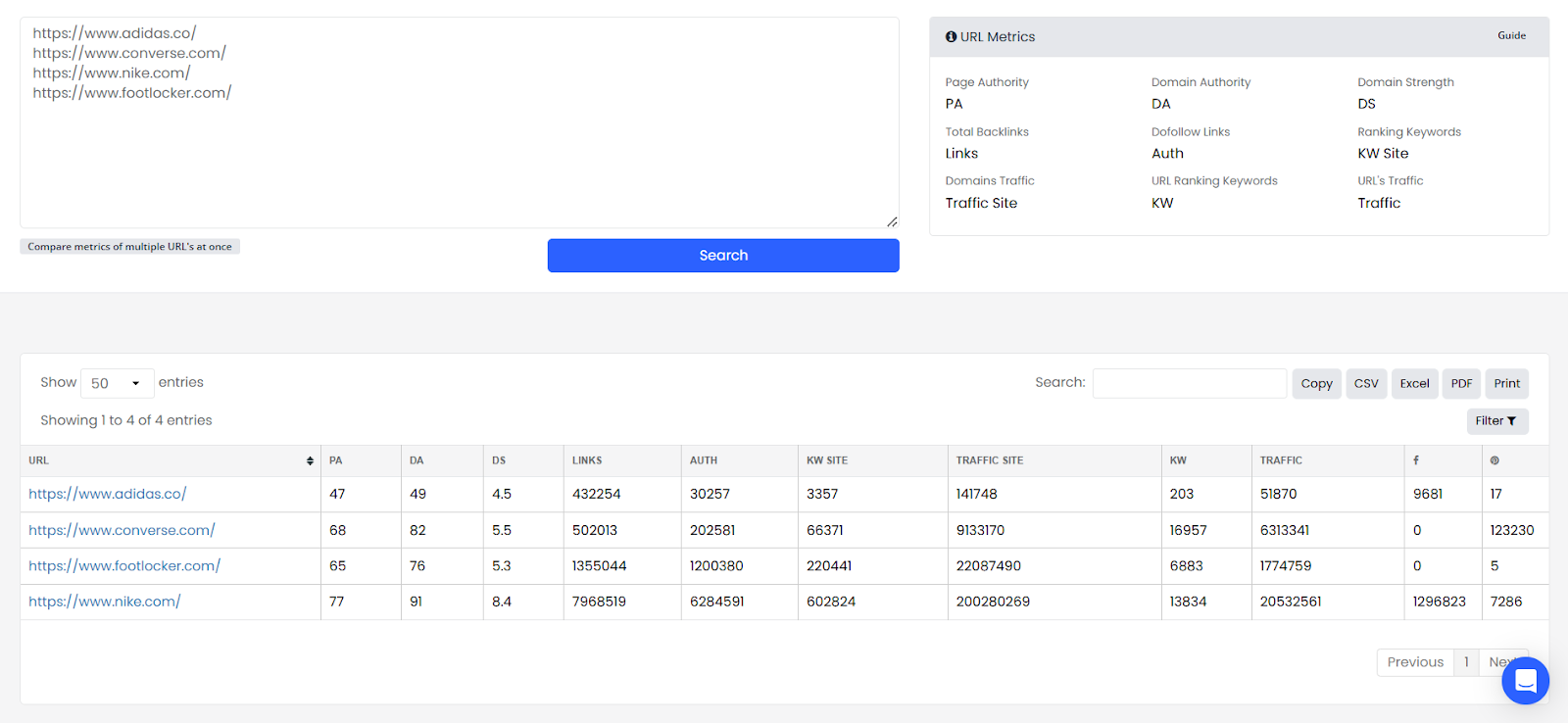
↳ You can also see the keywords your competitors are ranking for.
KeySearch lets you see which keywords a domain is ranking for. So, you can find out all the organic keywords of your competitors. This helps get an idea of their overall keyword strategy– so you can take inspiration, evaluate and adjust your strategy accordingly.
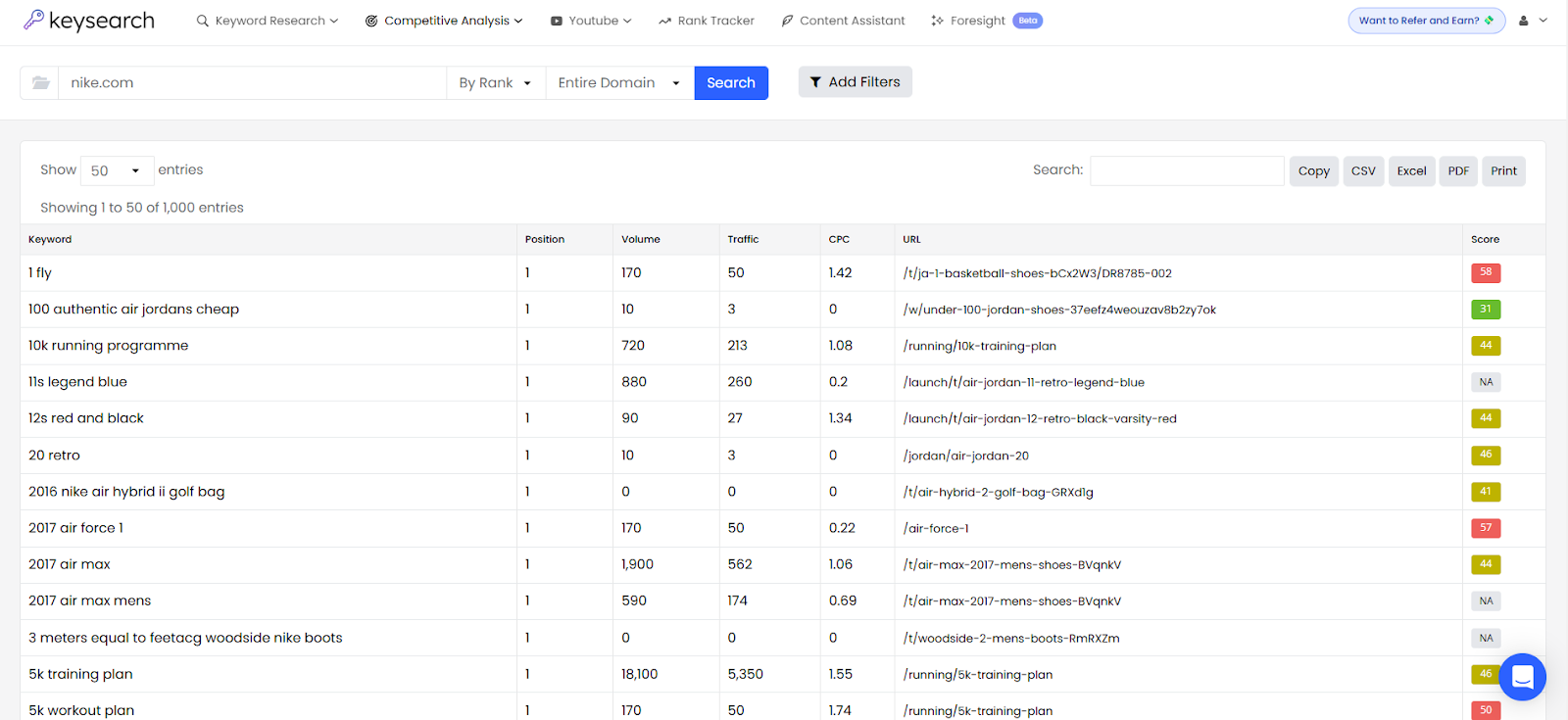
↳ Plus, all the data is easy to interpret and save.
I like how, no matter which KeySearch tool you’re using, it gives you super organized data in clear, sortable tables or graphs. This makes it very easy to consume and understand even vast and complex data.
And when you want to save any lists or data, the export options are conveniently placed on the top right of the most tools. This lets you save data in various formats like Excel, PDF, etc.
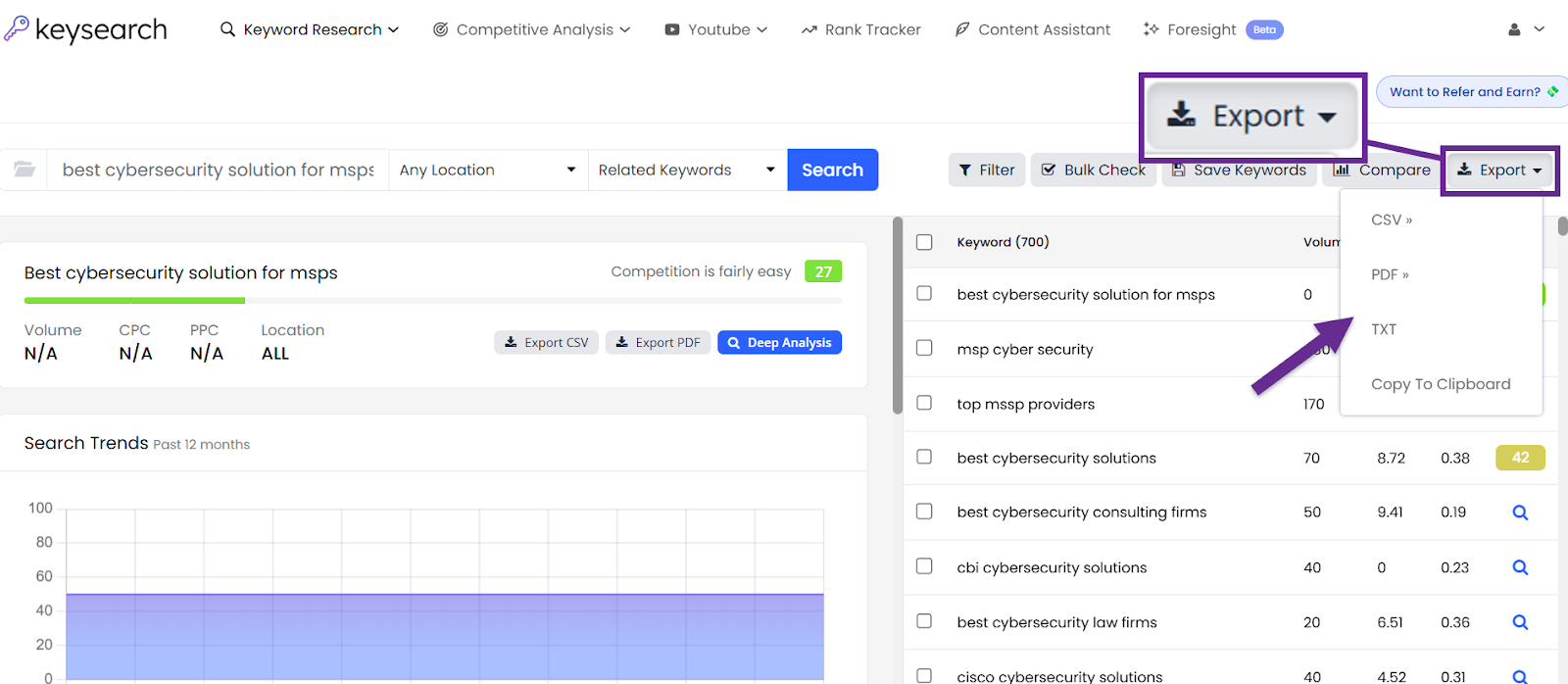
Tracking Ranking Trends is Super Easy
I also used KeySearch for tracking my keyword rankings and here’s what it was like:
↳ It’s perfect for a high-level overview of your keywords’ performance.
KeySearch’s Rank Tracker gives you a high-level snapshot of how your pages are ranking for your selected keywords. I like how it automatically detects and suggests relevant keywords. You can choose to get notified about your keywords performance on email. When something goes wrong, you can spot it and fix it right away.
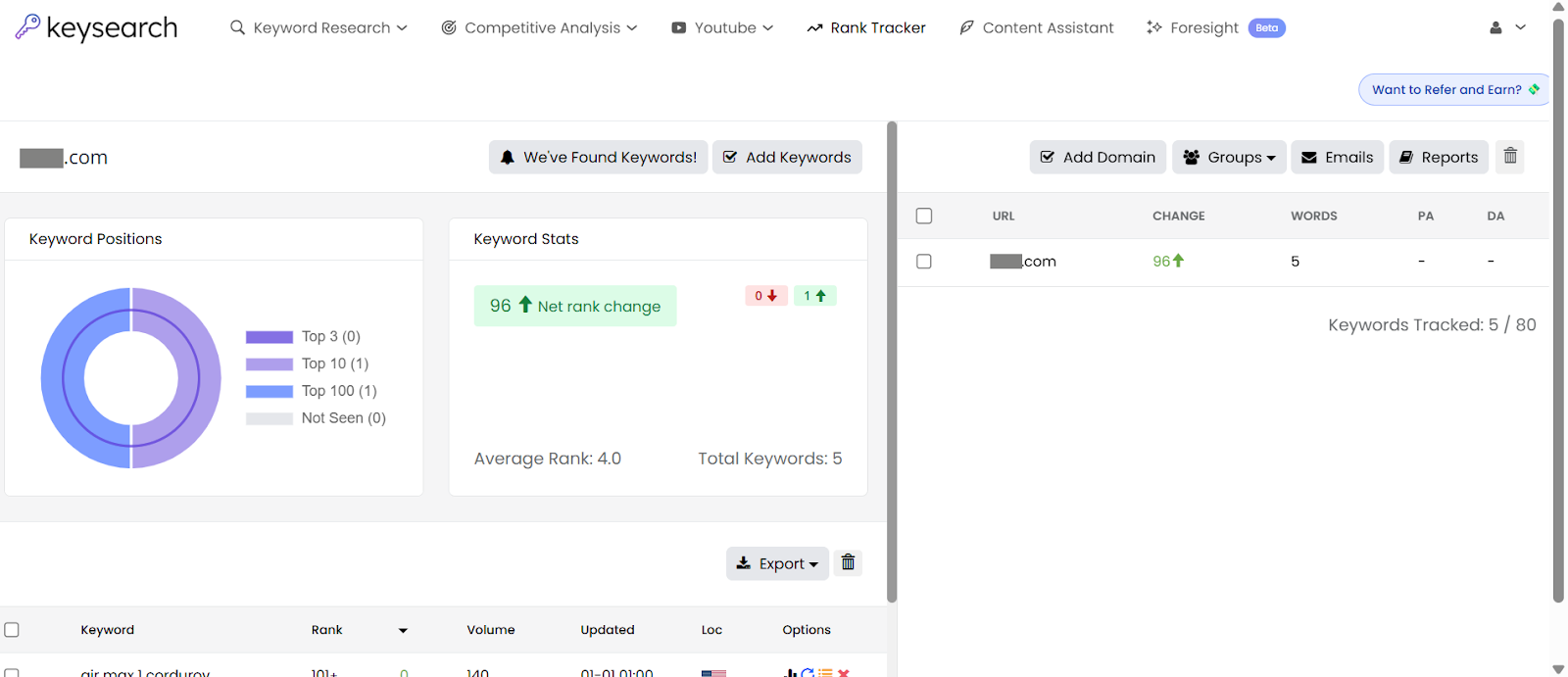
↳ But it’s quite limiting.
While the rank tracker shows trends over time, I found it less detailed than tools like Google Search Console. Its tracking options feel too limited. But that’s me. I can totally see it working for SEO beginners and those who don’t need very in-depth data and tracking options.
Backlink Tools Simplify Finding Find Link Gaps and Opportunities
While not as advanced as dedicated backlink platforms, KeySearch provides a basic backlink analysis module.
↳ It gives you a clear and helpful backlink profile overview.
You can see the number of backlinks and referring domains for your site and your competitors. This would give you enough insight to start building a list of potential link-building opportunities. I also use this feature to identify sites that link to my competitors but not to me. This gives me new outreach opportunities.
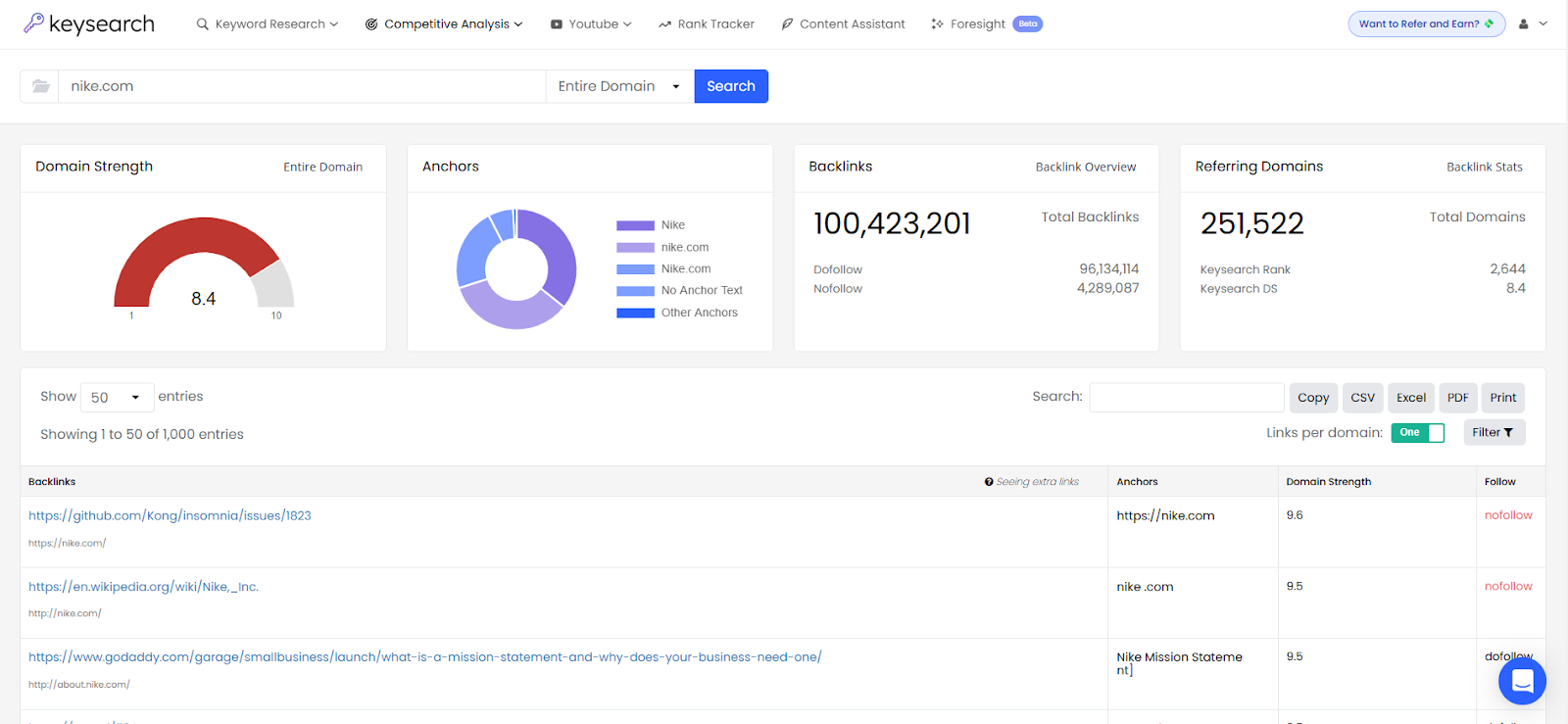
↳ But this data isn’t super specific.
I think the backlink data is basic and lacks depth found in premium tools like Semrush. So, if you want granular backlink data, it’s not for you. But then again, if you can’t afford a premium tool like Semrush, something is better than nothing.
Site Audits Deliver Quick, Actionable SEO Health Checks
KeySearch also lets you do a quick technical health check of your website.
↳ It gives you essential technical SEO insights with ease.
When you run a Site Audit using KeySearch, it gives you an easy to digest report of your site’s health. First thing you see is the overall score of your website’s health and a quick list of key issues.
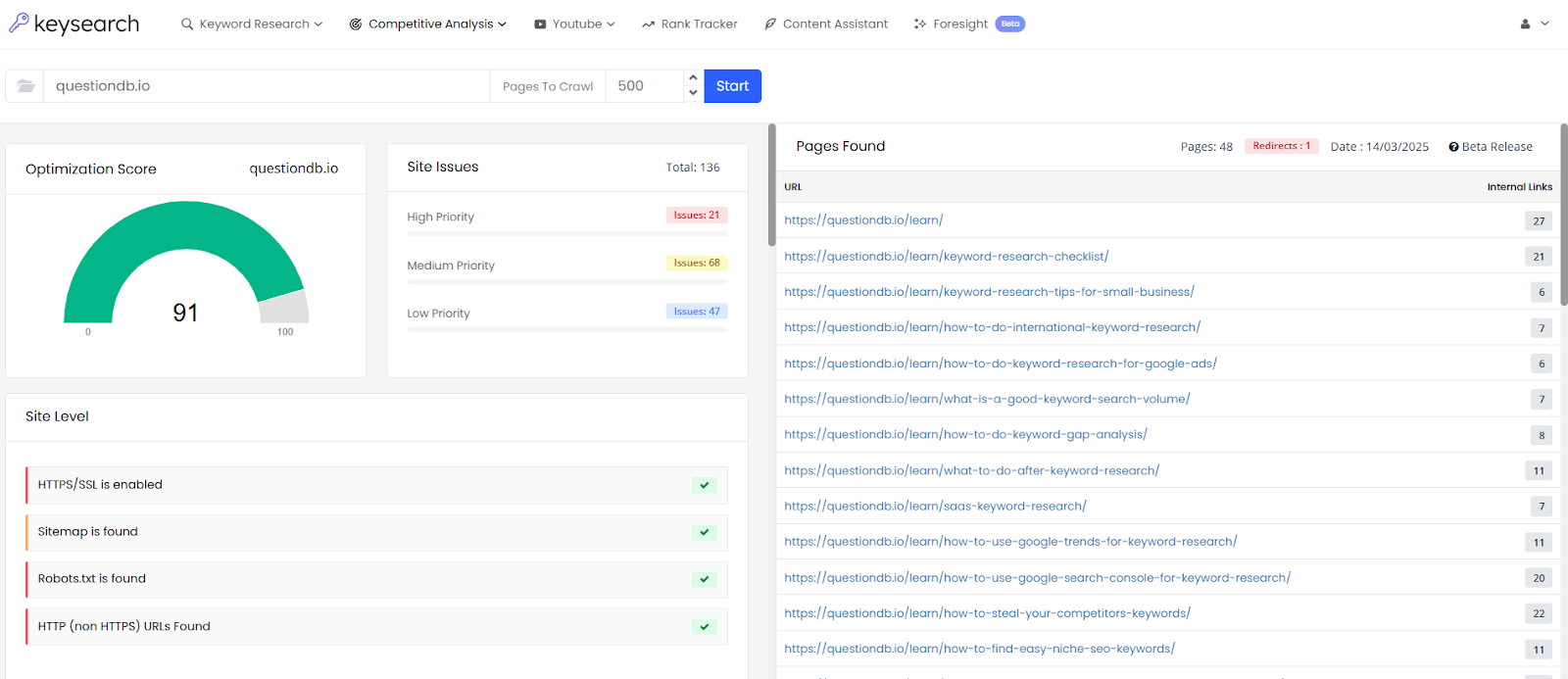
Other than the list of pages it found on your website, it divides the report in helpful sections like–
→ Site Level: It shows if you use encryption, have a sitemap for search engines, include a robots.txt file to guide crawlers, and list pages using insecure HTTP.
→ Links: It tells you about all the links on your website– internal and external. This makes it easy to identify broken links.
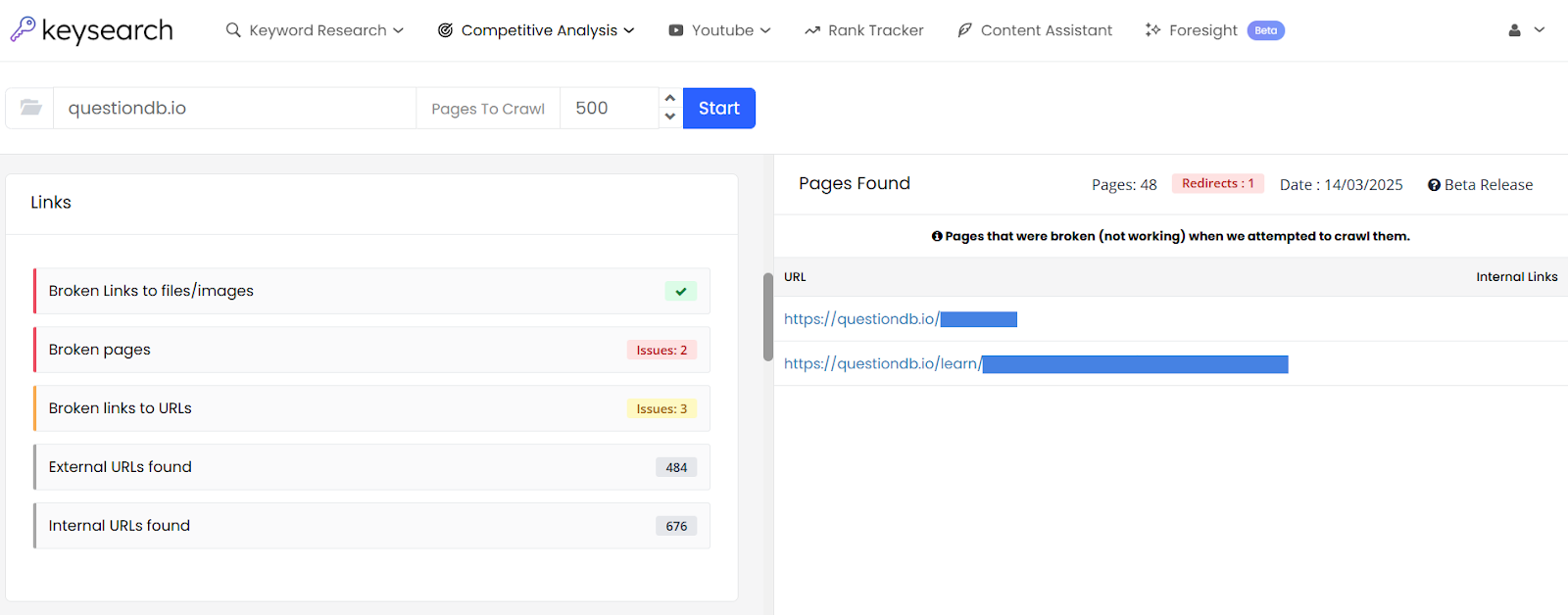
→ Meta / Tags: This gives you a quick idea of your page’s key meta and header elements. It shows if you have Duplicate Meta Descriptions, Duplicate Meta Tags on the same page, Missing Meta Descriptions, and Missing H1 Tags.
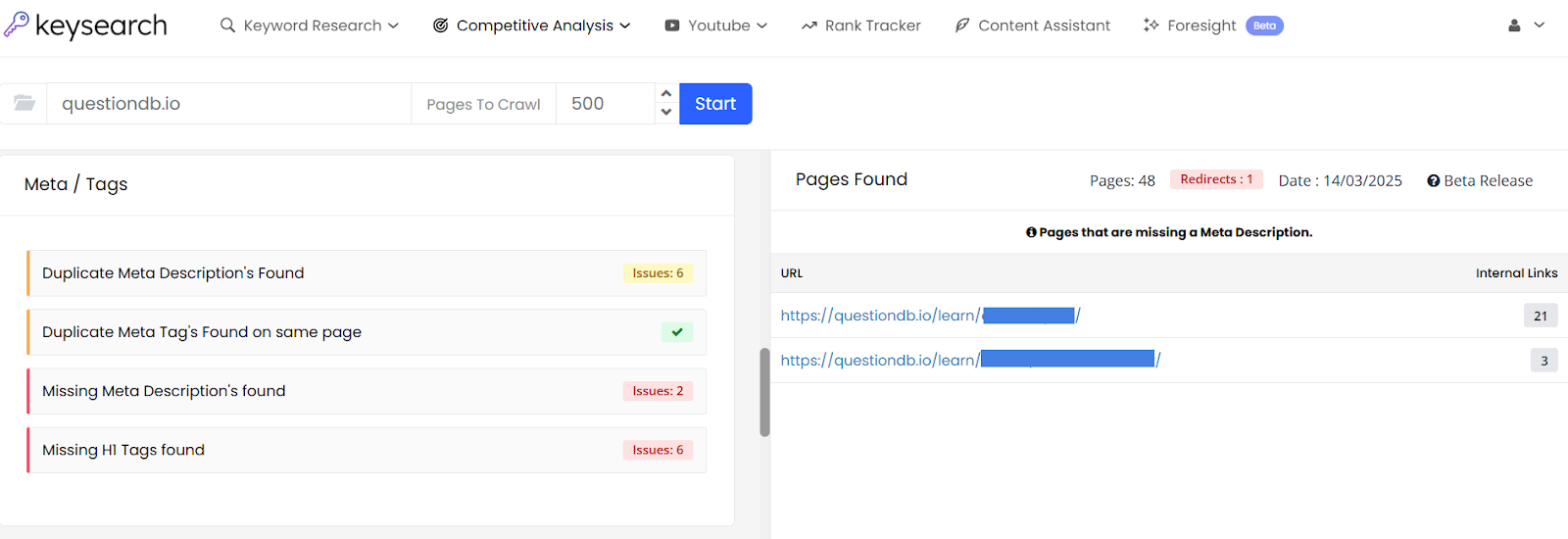
→ Title Tags: It reviews your page titles to show whether they are unique, properly sized, and correctly placed on every page.
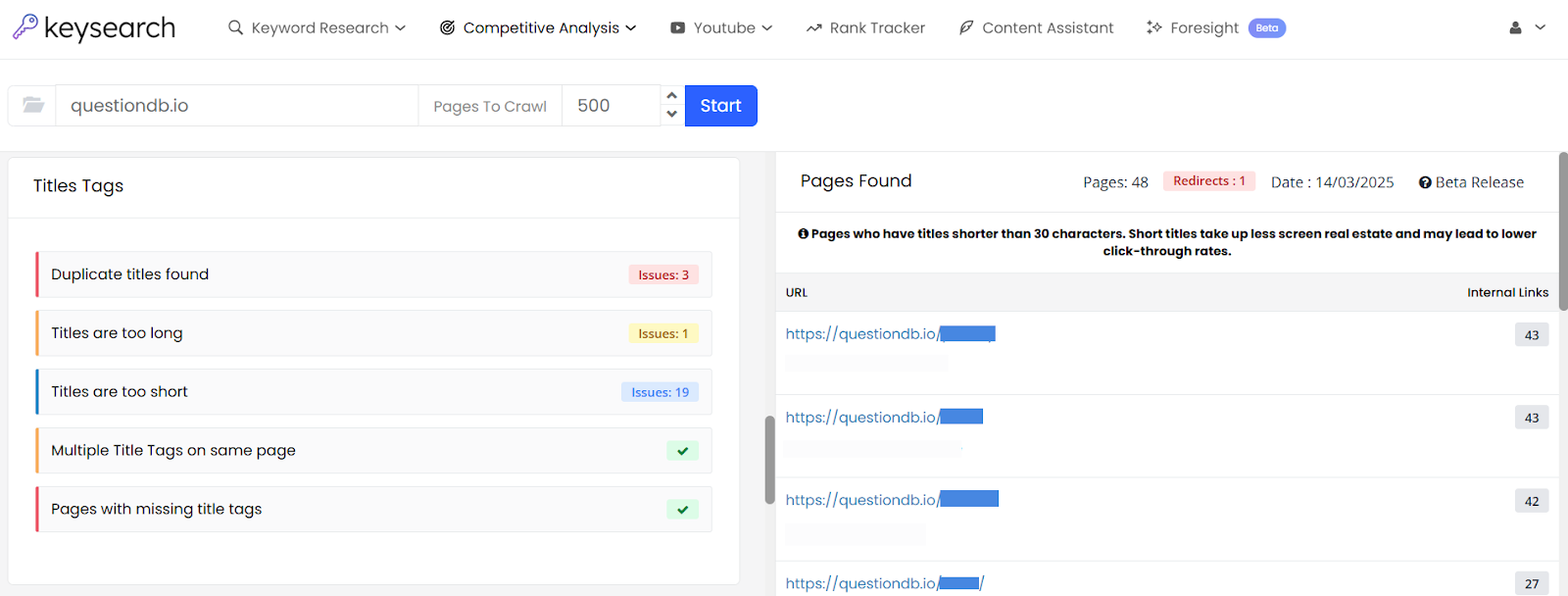
→ Content: It flags issues such as duplicate content, missing image attributes and DOCTYPE, low readability, outdated HTML tags, mixed HTTPS/HTTP links, canonical tag issues, and error responses, etc.
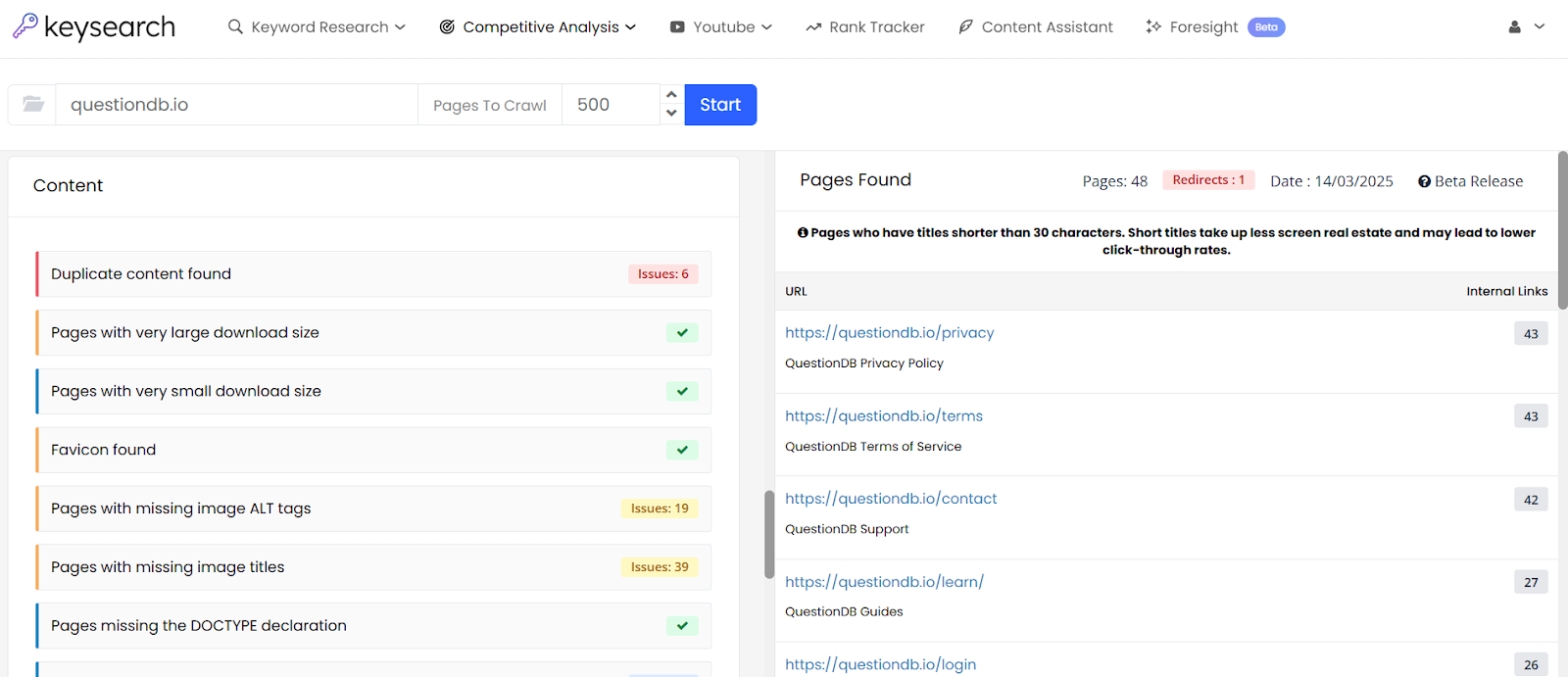
Now, this is just great for a quick optimization…
↳ But I recommend it for basic checks only.
It is not as detailed as premium site audit tools like Semrush. So, it’s best to use it for quick checks rather than deep technical analysis. Still, it’s good enough for getting a high-level view of your site’s SEO health.
It Makes Creating Keyword Optimized Content So Simple
KeySearch also includes a Content Assistant to help you create optimized content.
↳ Its content guidance can take a lot of guesswork out.
Like if you give it your target keyword, it suggests “must-use” keywords, related terms, and common questions from top-ranking pages. This helps you make sure that at least your content covers the essential keywords and aspects.
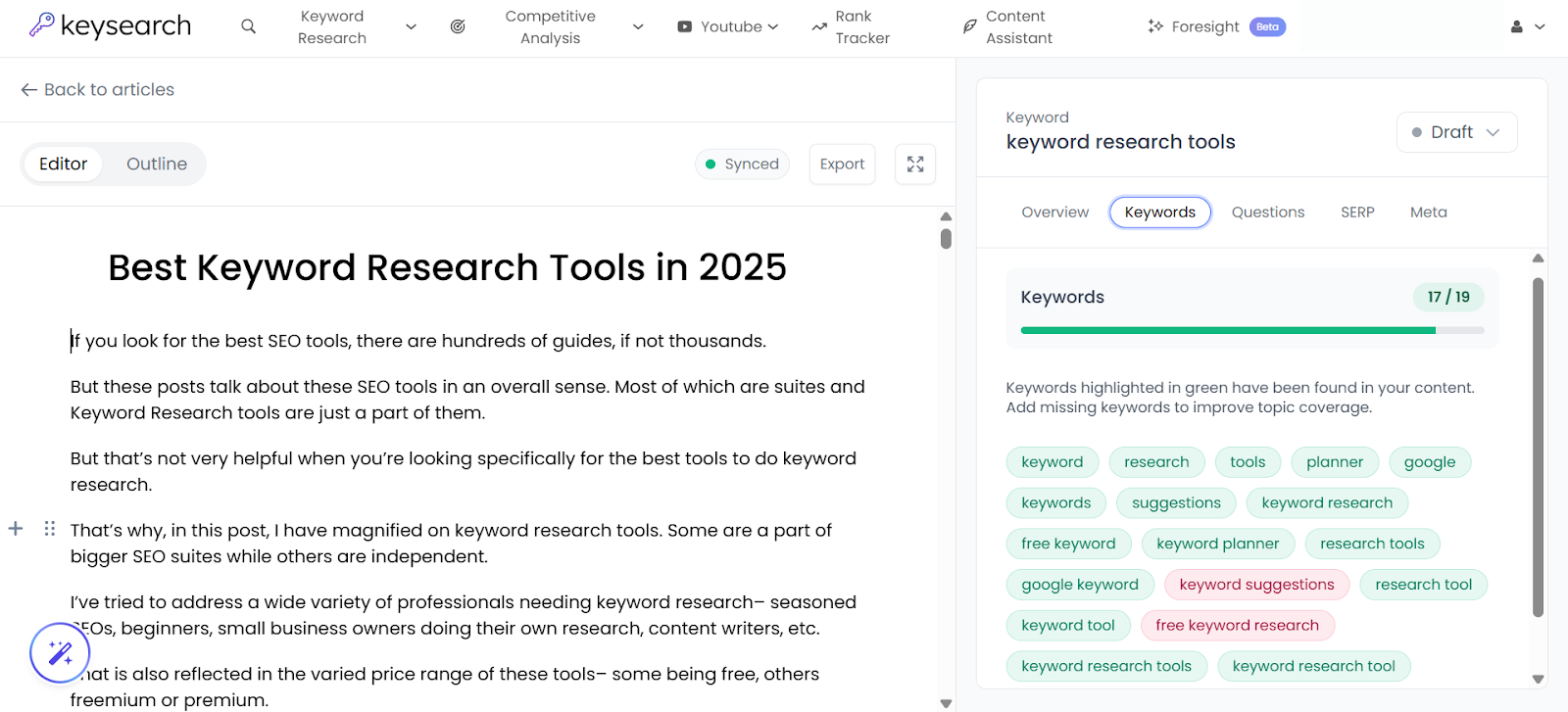
↳ But its occasional formatting issues can disrupt your workflow.
I have used the assistant to double-check if my posts included all relevant keywords. Although it saved time, I did have to reformat some text when copying it over to my CMS. And remember, it’s more of a broad guide than a complete content generator.
Bonus Tools Expand Its Keyword Research Capabilities
↳ It offers basic YouTube keyword research tools.
I also briefly explored the YouTube Research feature to see if it could help with video keyword ideas. It gives you similar metrics for YouTube keywords.
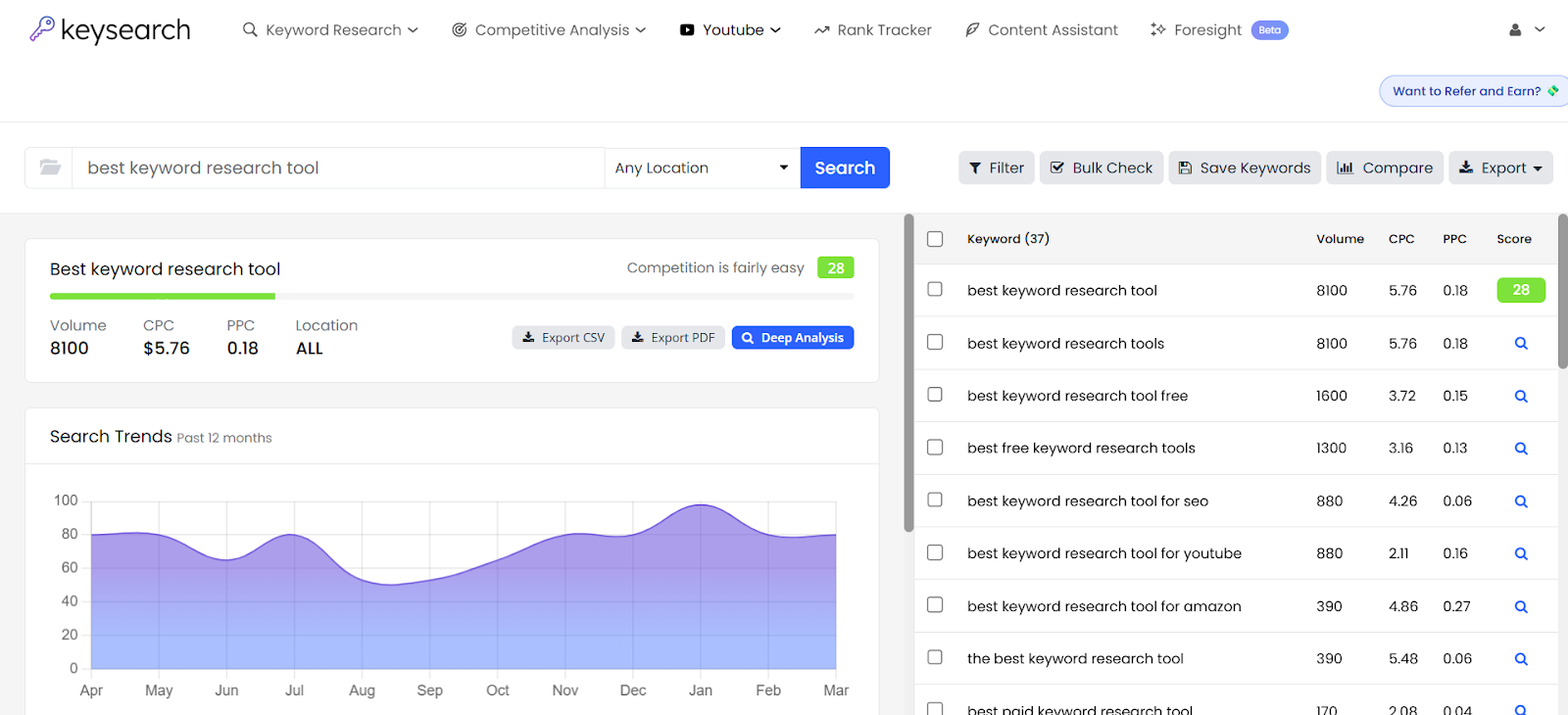
You can also analyze up to 50 keywords for YouTube in bulk. But again, you’ll have to enter them manually, separated by commas. Overall, KeySearch can help you with basic YouTube keyword research.
↳ It can also help automate keyword research.
KeySearch has an AI-powered tool: Foresight, that can help automate your keyword research significantly. But it’s only accessible in the Pro plan. And since it’s still Beta, it’s not perfect. While I don’t personally use this tool, I think certain beginners and professionals can benefit from it.
KeySearch Offers Great Value for Its Price
When it comes to keyword research and SEO tools, KeySearch’s strongest point is its affordability and great value for money.
↳ It offers very affordable plans, and a free trial.
The Starter plan is $24 per month, offering 200 daily keyword searches and basic rank tracking. If you need more, the Pro plan, at $48 per month, increases this to 500 searches with additional tracking credits. But I, personally, don’t like its credit-based system.
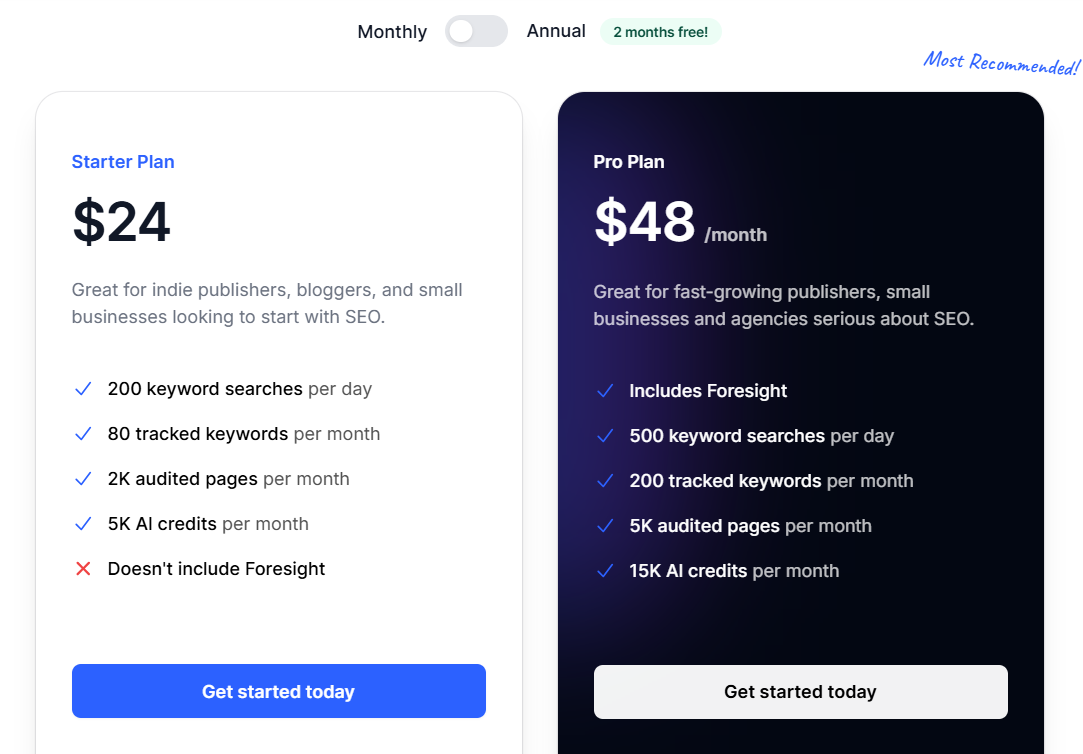
So, if you’re not sure, you can always sign up for the free trial first, test things out and decide.
↳ It’s perfect for small budget content projects.
Compared to premium suites like Ahrefs or Semrush, KeySearch provides a solid suite of essential features at a fraction of the price. I’d recommend it for beginners and small businesses looking to stretch their SEO budget.
So, while you won’t get the deep analytics of more expensive tools, the cost savings make it a smart choice if you’re just starting out.
What I Like and Don’t Like about KeySearch
Here’s a quick overview of KeySearch’s strengths and downsides:
| Pros | Cons |
|---|---|
| ✔️ Affordable and budget-friendly | ✖️ Limited free/trial functionality |
| ✔️ Easy-to-use interface | ✖️ Basic backlink data compared to premium tools |
| ✔️ Fast keyword research with clear metrics | ✖️ Some features may require extra credits |
| ✔️ Effective competitor gap analysis | ✖️ Formatting issues with content assistant |
| ✔️ Suite of SEO features | |
| ✔️ Helpful content assistant for drafting posts |
Who is KeySearch Best Suited for?
In my opinion, Keysearch is:
| Ideal For | Better Off Without It |
|---|---|
| ✔️ Beginners in SEO | ✖️ Advanced SEO professionals needing in-depth data |
| ✔️ Budget-conscious bloggers and small businesses | ✖️ Enterprises requiring extensive backlink analysis |
| ✔️ Those seeking an all-in-one, simple SEO tool | ✖️ Users needing highly detailed competitor insights |
| ✔️ Those who value ease-of-use over feature depth | ✖️ Marketers needing advanced rank tracking options |
Perfect for High-Level Keyword Research & Reporting on a Budget
KeySearch is a reliable, affordable tool for basic SEO needs. If you’re just starting out or need an all-in-one tool without breaking the bank, KeySearch is a smart option. However, if you need very detailed data and advanced features, it should at least not be the only tool you use.
Check out more guides on keyword research tools:
↳ Best Facebook Ads keyword research tools
↳ Detailed review of KWFinder (Mangools keyword research tool)
↳ Find out whether VidIQ or TubeBuddy is a better YouTube keyword research tool
Frequently Asked Questions
I find KeySearch a solid tool for basic SEO tasks. It simplifies keyword research, competitor analysis, and rank tracking, making it a smart choice for beginners and small businesses. While it doesn’t offer the depth of premium tools, it provides enough insights to kickstart your SEO strategy on a budget.
KeySearch offers two main plans. The Starter plan costs about $24 per month, giving you 200 daily keyword searches and basic rank tracking. The Pro plan costs around $48 per month and increases the daily search limit to 500, along with extra tracking credits and additional features.
KeySearch automatically crawls keywords and builds a large database for quick research. In contrast, Rank IQ crafts its keywords based on specific niches, ensuring each keyword is easy to rank for regardless of your domain rating. Rank IQ tailors its suggestions to fit niche needs more precisely than a general crawler.
You can do basic keyword research for free using methods like Google Autocomplete and free tools such as Keyword Surfer. However, you need to invest in paid tools like KeySearch, Semrush, Ahrefs, etc. (depending on your budget) for advanced keyword research with detailed metrics, automation, and in-depth analysis.
To use KeySearch for keyword research, enter a seed keyword and select your target region. The tool provides search volume, CPC, PPC, and a difficulty score, along with related keywords. Use filters to refine results and explore deeper metrics with features like Deep Analysis and Quick Difficulty for bulk checks.
KeySearch gives you a keyword difficulty score that estimates how hard it is to rank for a term. This score factors in search volume, competition, and other key metrics to help you select low-difficulty keywords that fit your content strategy. Use it as a guide to prioritize keywords with easier ranking potential.
I find KeySearch’s data generally accurate for basic keyword research. It shows search volume, CPC, PPC, and difficulty scores quickly. Sometimes, I notice small discrepancies compared to premium tools, but the insights serve as a good directional guide. I cross-check important keywords using additional sources when needed for more precision.
KeySearch features a clean, intuitive interface that works well for beginners. I navigate through its tools without any hassle and appreciate the clear layout. The organized data and simple filters let me quickly uncover keyword opportunities and analyze competitors, making it an ideal starting point for those new to SEO.
KeySearch offers essential SEO features at a much lower cost than Ahrefs or Semrush. I enjoy its speed and simplicity for keyword research and competitor analysis. While it lacks the advanced depth and detailed metrics of premium tools, it provides a solid, cost-effective option for beginners and small businesses.
I use KeySearch’s rank tracker to monitor keyword trends over time. It provides a high-level overview of ranking performance and sends email notifications for significant changes. Although it does not deliver as detailed data as specialized tools, it works well for quick snapshots and helps me adjust my strategy when needed.
The Content Assistant helps me draft posts and ensure I cover essential keywords. It suggests related terms, common questions, and must-use keywords based on top-ranking pages. I find it saves time and sparks new ideas, though I occasionally need to reformat the output when transferring text to my CMS.
KeySearch offers excellent value for budget-conscious users. I find its Starter and Pro plans deliver all essential SEO features at a fraction of the cost of premium tools. It covers keyword research, competitor analysis, and basic rank tracking effectively, making it a smart choice for beginners and small businesses seeking an affordable solution.
